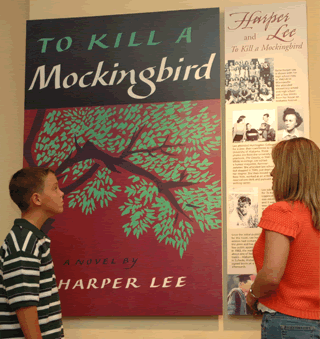July 8th, 2010
We couldn’t let this milestone pass without comment. The 50th Anniversary Celebration of To Kill A Mockingbird kicks off today in Monroeville with a viewing of the 1963 film, continues Friday and Saturday with a marathon reading of the book (among other things) and concludes Sunday afternoon with a huge party to commemorate the book’s publication date.
Visitors to the Monroe County Heritage Museum in Monroeville’s Old Courthouse Museum
We couldn’t think of anyone better to ask about this book’s impact than noted historian Wayne Flynt, professor emeritus at Auburn University and co-founder of the Alabama Poverty Project. Flynt, who has been called the conscience of Alabama, told me that the book influenced the course of his entire career. In the early 1960s, discouraged by racism and prejudice in Alabama’s white churches, Flynt had given up hope of ever living or serving as a minister in the state and moved away. When he read To Kill A Mockingbird in the wake of the Sixteenth Street Baptist Church bombing in 1963, he realized that if a white woman from Monroeville could write such a novel about tolerance and empathy, there was hope for the state yet.
After earning his PhD from Florida State University, he returned home and wrote the definitive modern history of our state, Alabama in the Twentieth Century. Dr. Flynt breaks down the dynamics of race, class, religion, and poverty as only he can. That’s right: we have Harper Lee’s novel to thank for Wayne Flynt’s work in Alabama – work that includes our own founding in 1993.
Flynt observes:
By almost any measurement, To Kill A Mockingbird is the most important novel ever authored by a native Alabamian. The Pulitzer Prize–winning novel spent 88 weeks on bestseller lists, and by the 35th anniversary of its publication in 1995 had sold 30 million copies. It continues to sell almost a million copies a year and is often ranked among the top 40 best-sellers listed in the newspaper USA Today. The themes and issues raised in the novel remain relevant, and thus To Kill A Mockingbirdwill likely hold its place in public discourse on tolerance, justice, and humanity.
Popular acclaim for the novel owes much to the message of tolerance that Lee proclaimed during an intolerant age. Atticus’s admonition to his children that they will never understand a person until they consider life from his or her point of view is viewed as trite by some critics, but the novel’s message had profound effects for Jews in Prague, homosexuals in Berlin, and gypsies in eastern Europe who had been the victims of Nazi oppression. It was no less relevant to the displaced whites from Arkansas and Oklahoma who trekked to California as migrant laborers during the 1930s, or to Appalachian whites who migrated to auto industry jobs in Michigan during the 1940s and 1950s.
To Kill A Mockingbird has played a significant role in the intense half-century debate Americans have had about the role of education in fostering moral values. Should public schools teach values? If so, what values? Whose values? Hundreds of thousands of American teachers have chosen to teach To Kill A Mockingbird, deciding that Harper Lee’s values represent the best of humanity: tolerance; kindness; civility; justice; the courage to face down community or family when they are wrong; and the compassion to love them despite their flaws. Despite these qualities, the novel is one of the books most frequently banned by local school boards because of the plot (which involves an alleged rape) and the theme (tolerance for people who do not conform to community norms). When the book first appeared, Alabama’s White Citizens Council called the work “communistic” for promoting racial integration and tried to have the state director of the Alabama Public Library Service fired for refusing to remove it from state libraries.
Ironically, a novel written by a woman from Monroeville in Alabama’s Black Belt has become the primary literary instrument worldwide for teaching values of racial justice, tolerance for people different from ourselves, and the need for moral courage in the face of community prejudice and ostracism.
-excerpted from Dr. Flynt’s Encyclopedia of Alabama entry on To Kill A Mockingbird
Wayne Flynt currently serves as the editor-in-chief of the Encyclopedia of Alabama and serves on APP’sBoard of Directors.
Posted by Robyn Hyden
